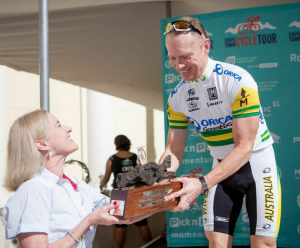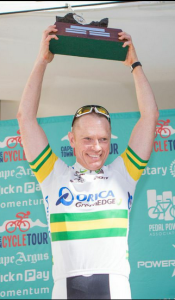I compete against mid-life dopers. I ride with a power meter, a crank-mounted device that measures the number of watts you are producing at any given moment on the bike. So I don’t just feel the pain that I go through trying to stay with some of the middle-aged amateur cyclists I race against – I can actually see the numbers they are putting out. And sometimes those numbers are simply unbelievable.
I participated in a multi-day race in Sardinia last year against Masters riders from all over Europe. About half way into the 140km first stage I found myself putting out around 360 watts at the base of a long climb just to stay with two Italian guys in my age group category. These were not little skinny guys like me (I am 168cm tall and my race weight is around 64 kilograms) but tall, well-built men of at least 75 kilos.
The two Italians were smoothly riding away from me on the climb, and taking into account their body weight and the incline, this meant that they were putting out as much as 10 percent more power than I was – maybe 390 watts – and they were holding it! When in peak condition I can hold 360 watts for about ten minutes of pedaling, before I completely blow-up. So I shook my head and watched them ride away.
To put 390 watts in perspective, Chris Froome’s estimated power output on the mountain stage he won in the Tour de France this year was around 410 watts. So what I witnessed in Italy just didn’t make sense for middle-aged amateur cyclists. I Googled the names of the two Italians that evening to discover that one of them had recently returned to competition after a two-year doping suspension.
Over the course of the week-long race, these two guys raced aggressively every single day – there seemed to be no fatigue, and they attacked constantly. I eventually finished third for my age group classification, but was more than twelve minutes behind by the end of the week. The other guys in my age group joked that we were engaged in two-speed racing – the winning Italians in one class, and the rest of us in the other.
The fact is that doping, and especially the use of the blood booster EPO, is all too common in amateur Masters cycling. Unlike professional cycling, there is no biological passport system involving the systematic and regular testing of competitors. In many countries, such as Belgium, there are random checks at race events but typically just a handful of riders are tested. In many events, like the one that I raced in Italy, there is no testing at all. So the odds of getting caught are quite small.
Doping products such as EPO are affordable, and readily available for purchase on the Internet. The real challenge is how to deal with the mid-life dopers, and I think that out of season testing must become a reality for those Masters riders who are performing ‘exceptionally’ in race events. For example, I know of a 50 something cyclist who won 8 out of 10 Masters events in a Belgian Kermesse series a few years ago. Given the level of competition in Belgium, that kind of performance verges on the unbelievable. Out of season testing of amateurs is already done to an extent in the US, and scores of riders have been suspended as a consequence. The same should be done in continental Europe.
Although there is very little research about doping by Masters athletes, I have read a lot on the psychology of doping at the elite level of sport. Much of the literature talks about game theory. The simplest game in game theory is “prisoner’s dilemma”. In the athletes’ version, both cyclists will be better off if neither takes drugs, but because neither can trust the other, both have to take them to make sure they have a chance of winning.*
If it is highly likely that the majority of your competitors are doping, then you have two options. You can choose not to dope, and be almost certainly beaten as a consequence, or you can dope, and be given a fighting chance. I have read scores of interviews with cyclists who doped during the Armstrong era, and almost all of them talked of this athlete’s dilemma.
The financial stakes in professional sports can be high, and this is also a factor that undoubtedly drives some to dope. But it is not just about fame and fortune – many young cyclists who encountered the doping culture of the 1990s and early 2000s had dreamed of professional cycling since they were kids, sacrificing education and career opportunities for a sporting path. They had travelled far from family and friends to make it as a rider in Europe, and were then sucked into an environment in which doping was the norm – where it was expected by peers and mentors. For them, cycling was a job and doping became a tool of the trade.
But the reality for middle-aged cyclists is very different. There is certainly no fortune, as even the best amateur Masters racers spend far more on equipment, travel and race costs than they ever get from prize money. Cycling is a passion, not an income generator. Fame is also elusive, as Masters cycling is rarely reported on by the mainstream media.
We are not surrounded by people who encourage us to dope. In fact, those who cheat disgust most of my cycling peers. A Belgian rider who is almost fifty years old won his age-group category of a week-long Masters race in Italy this year, and also rode unbelievably well on the general classification. Not only did he finish in the top ten, but he consistently outclassed riders twenty years his junior – every day of the event. He has served a previous doping suspension, and was openly ridiculed by other cyclists at the race. I wondered if this was fair, but his performance on the road left few doubts in many peoples’ minds.
To me it seems that the prisoner’s dilemma still plays a role in elite Masters cycling – the fear that others are doping, so to win I must dope too. But what this also says is that the individual puts ‘winning’ above all else. And in the absence of financial rewards and fame ‘winning’ is essentially about two things: firstly a sense of self-achievement, and secondly recognition from family, friends and the Masters cycling community.
But in both cases the outcome is a lie for dopers – you have not achieved your true potential, and the recognition that you are receiving is undeserved. It is one thing to mislead the Masters cycling community about the reasons for your performance, but to do so to spouse, children and wider family and friends strikes me as very sad indeed.
And this is why I pity the mid-life dopers. Because what they have failed to acquire is the wisdom that at this stage of life, winning is not just about receiving a medal after a bike race. It’s about how you got there, and who you have become along the way.
Earlier this year I won my age-group classification and was also 1st International Amateur Rider overall at the Cape Town Cycle Classic. It was the first time in my life to stand on the top step of the podium at a major international race.
Standing on that podium in South Africa, I held the trophy high.
*For a good discussion of game theory and the athlete’s dilemma see: The Economist, Doping in Sport: The Athlete’s Dilemma, 20 July 2013. ARTICLE


Interesting. I have some (…only some) sympathy with the pro’s who felt compelled to cheat in the past, for the reasons you describe, but to coin a well used used cliche surely to do so in amateur cycling you are mainly cheating yourself. At the risk of making sweeping generalisations, is it the case that in some cultures the idea that doping is morally wrong carries less weight than others? I.e. It’s not REALLY cheating…just part of the game? I don’t know.
LikeLike
The reaction to ex-dopers in countries like Belgium, Spain and Italy is interesting as there is much less moralising and criticism. I think this has to do with the belief in these countries that cycling is a job, and many top cyclists have traditionally come from working-class roots. So the idea that doping was simply a tool of the trade, and therefore a necessity to earn a living, is much more widely accepted. But I don’t think that this translates to the contemporary Amateur Masters scene, as the moral code has shifted significantly since the Armstrong era. The real challenge is how to deal with it, and I think that out of season testing must become a reality for those Masters riders who are performing ‘exceptionally’ in race events. This is already done, to an extent, in the US and scores of riders have been suspended as a consequence. The same should be done in continental Europe.
LikeLike
Great inspiring article.. good line… it is not about winning, but reaching your true potential
LikeLike
Jamie, it can be very frustrating when the competition is not on a level playing field. How one plays is what matters and that is what builds repeatability/sustainability as it is backed by a process and there are no short cuts.
LikeLike